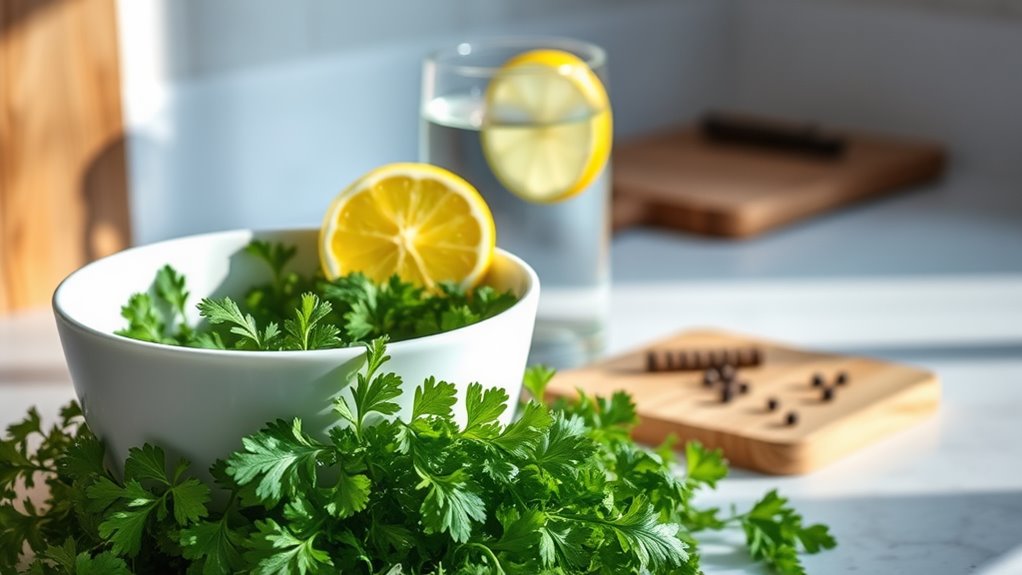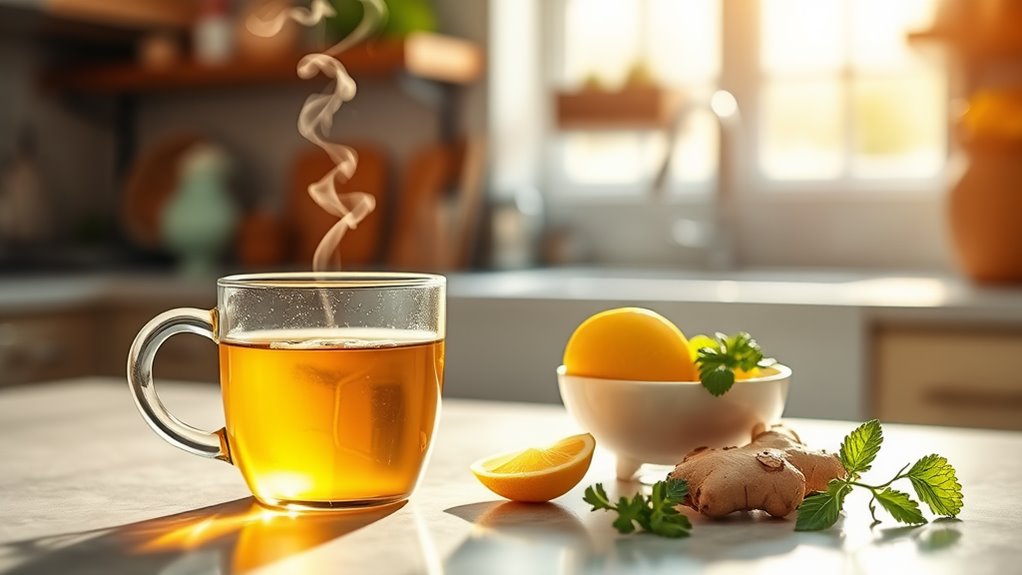Say Goodbye to Bloating With This Soothing Remedy!
Bloating can feel like an uncomfortable balloon in your stomach, yet it often stems from simple dietary choices. Fortunately, there’s a soothing remedy that can help ease that discomfort. By incorporating ginger tea into your routine, you can stimulate digestion and reduce gas buildup. But that’s just the start; understanding the full range of remedies and lifestyle changes can make a significant difference in your digestive health. Let’s explore these options further.
Key Takeaways
- Sip on ginger tea to stimulate digestion and alleviate gas buildup effectively.
- Enjoy peppermint tea, which contains menthol to relax the digestive system and reduce bloating.
- Incorporate probiotic-rich foods like yogurt or take supplements to promote healthy gut bacteria.
- Apply a warm compress to your abdomen for soothing relief from bloating discomfort.
- Engage in gentle yoga poses, like Child’s Pose, to encourage gas release and ease bloating.
Understanding Bloating and Its Causes
Have you ever wondered why you sometimes feel uncomfortably full or swollen after a meal? Bloating occurs when your digestive system produces excess gas or struggles to process food.
Common causes include overeating, consuming carbonated drinks, and eating too quickly. Certain foods, like beans, broccoli, and dairy, can also lead to bloating, especially if you’re intolerant.
To alleviate discomfort, you might try natural bloating remedies such as ginger tea, peppermint, or apple cider vinegar. These can help soothe your digestive tract and promote better digestion, making you feel more comfortable after meals. Incorporating ginger and kitchen staples into your routine can enhance digestion and reduce bloating effectively.
Understanding these causes is crucial for managing bloating effectively.
Natural Remedies to Soothe Bloating
What can you do to ease that uncomfortable bloating after a meal?
Try sipping on peppermint tea, as it contains menthol, which can relax your digestive system.
Ginger is another great option; it helps stimulate digestion and reduce gas.
You might also consider taking probiotic supplements, which promote healthy gut bacteria and aid digestion.
A warm compress on your abdomen can provide soothing relief, too.
Lastly, gentle yoga poses, like the Child’s Pose or Knees-to-Chest, can encourage gas release.
Implementing these natural remedies can significantly enhance your comfort and help you feel more at ease after meals. Additionally, understanding the science behind bloating can empower you to make more informed dietary choices.
Dietary Changes for Digestive Health
Making thoughtful dietary changes can significantly enhance your digestive health.
Start by increasing your fiber intake through fruits, vegetables, and whole grains, which promote regular bowel movements. Stay hydrated by drinking plenty of water, as it aids digestion and prevents constipation.
Reducing processed foods and added sugars can also minimize inflammation and bloating. Consider incorporating fermented foods like yogurt and kimchi, which contain probiotics that support gut health. Additionally, evidence-based remedies such as herbal teas can provide quick relief from bloating.
Finally, pay attention to portion sizes; eating smaller, more frequent meals can help your digestive system work more efficiently. These simple adjustments can lead to a healthier, more comfortable digestive experience.
Lifestyle Tips to Prevent Bloating
To keep bloating at bay, adopting certain lifestyle habits can make a significant difference.
Start by staying hydrated; drinking plenty of water helps digestion and prevents constipation. Incorporate regular physical activity, as even a daily walk can stimulate your digestive system.
Consider eating smaller, more frequent meals instead of large ones to ease the digestive process. Pay attention to how you eat—chew slowly and avoid talking while chewing to reduce swallowed air.
Lastly, manage stress through relaxation techniques like yoga or meditation, since stress can affect your gut health. Additionally, practicing proper positioning during bowel movements can enhance comfort and promote regularity. These simple adjustments can help you maintain a comfortable, bloating-free life.
When to Seek Medical Advice
When should you consider seeking medical advice for bloating?
If your bloating is persistent or accompanied by other concerning symptoms, it’s time to consult a healthcare professional.
Here are some key signs to watch for:
- Severe abdominal pain or discomfort.
- Bloating that lasts more than a few days.
- Unexplained weight loss or appetite changes.
- Presence of blood in your stool or vomit.
These symptoms could indicate underlying issues that need attention. Additionally, if you experience sudden changes in bowel habits, it may be important to seek medical advice as this can signal potential digestive problems.
Don’t hesitate to reach out to your doctor if you experience any of these warning signs, as early intervention can lead to better outcomes.




